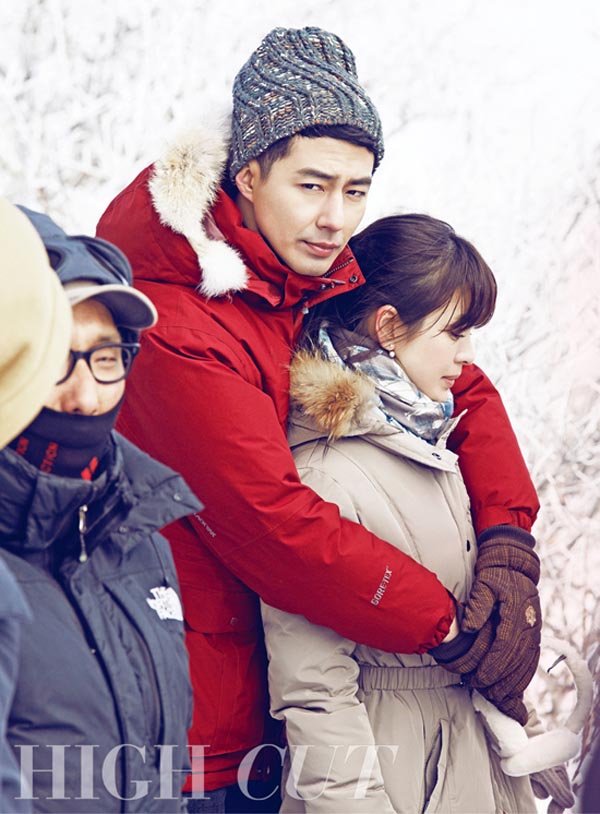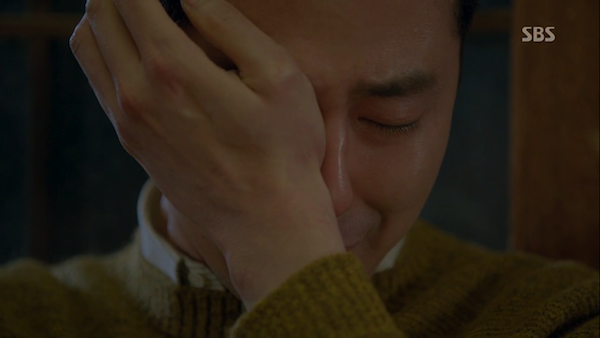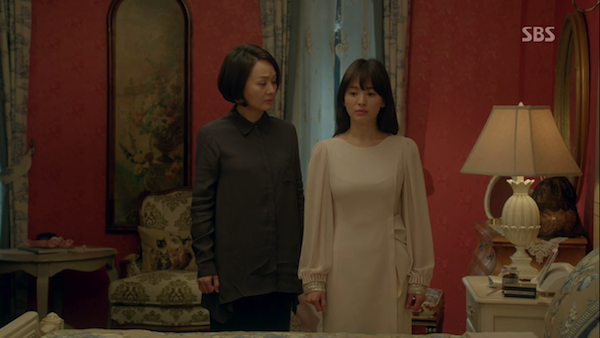 Does it drive anyone else crazy that the double-header premiere of “That Winter, That Wind Blows” throws the episode numbers off for the entire drama? Ending every second day’s episode on an odd number instead of an even one? No? Just me?
Does it drive anyone else crazy that the double-header premiere of “That Winter, That Wind Blows” throws the episode numbers off for the entire drama? Ending every second day’s episode on an odd number instead of an even one? No? Just me?
Anyway. We’re at the halfway mark of “That Winter, The Wind Blows” and things are picking up the pace. Young’s sickness is coming to the forefront, and the “will they tumor, won’t they tumor?” questions are blazing and driving some urgency into the characters’ actions. Our heroine is acting incredibly stubborn — as most suffering K-drama heroines are wont to do at halfway marks — and it’s all this back-and-forth that inspires people like Katy Perry to put out songs like “Hot n Cold.”
Young acts prickly towards Soo because of his Magic Pill, and then is loaded with suspicion once she finds out that it’s euthanizing medication meant for animals. I mean, he did say it was medication meant to remove a person from pain and living. Maybe she thought he was joking and that she was getting a piece of Bubblelicious instead, but I find this suspicion to be manufactured and illogical. She has a right to doubt his intentions towards her in general, but she was pretty staunch about using the medication if she ever needed to put herself out of misery, so she was perfectly aware of what it is.
We’re also starting to transition into the Corporate Power Play arc. I wish K-melodramas didn’t always involve at least one party that’s heir to a large conglomerate. It always makes conflicts drag: there will be someone fighting for legitimacy to inherit a company, a staged large-sized dinner, a scene where someone dresses up and looks like a Man/Woman for the first time to his/her love interest. Snooze.
Can’t someone wealthy for, I don’t know, selling really good tofu or something? Maybe be comfortably middle-class from running a bookstore? The problem with the chaebol/conglomerate trope is that it’s become a stand-in for wealth in Korea, and rarely does anyone ever even write convincingly about the problems that conglomerates face. There are just stern ahjusshis, CEOs, and large boardroom meetings where everyone talks a lot, but says nothing.
That’s why the fighting-over-the-company arcs of dramas always drag. Stakes are supposed to be high because there’s so much wealth at risk of falling into the wrong hands, but rarely do the inheriting parties feel a deep-seated connection to the companies they’re inheriting. Without that connection, the company politics are just posturing between the villains and the protagonists, and I have rarely watched a meaningful company struggle that wasn’t merely power play.
Secretary Wang is starting to act on her suspicions of Soo. But the heart of the story isn’t in how Soo may or may not threaten Young’s legitimacy at PL Group — we don’t even know what the damn company does and whether or not Young cares about the Group’s operations. The more important story point is Young’s lack of connection with other people, one that’s further complicated because there’s more than just her natural mistrust of people: a lot of it is Secretary Wang’s doing. Secretary Wang seems to be intentionally cutting her off from people so that Young can’t rely on anyone other than the secretary.
We see that Wang isn’t distrustful of Soo because she wants Young’s riches for herself. She’s more than a little possessive of Young, but we don’t know why. Instead of the cliched company politics, exploring Wang’s possibly unhealthy preoccupation with earning Young’s approval would make for a much more compelling character study. It’s hard to expect the writer to dissect the complexities of human psychology when something as big an idea as incest is used as a throwaway plot conflict, but Wang is proving to be a flat villain right now. She’s powerful, all-knowing, and a step ahead, and that’s incredibly uninteresting. (Also super uninteresting? Jo Mu-chul, whose exaggerated drawl and fake upper eye scar are laughably not intimidating.)
I said in my last post that Oh Soo is by far the more developed character, and while Oh Young has seen her share of character development, her fake brother has more depth than she does at the moment. We’re given a lot to work with that help us navigate his guilt and his burdens.
 In episode 7, when our Golden Quadruple is on their MT, Young talks about how it would’ve given her better peace of mind if people had only told her that it was okay not to be okay; that it was okay to be afraid, yada yada yada. Not to make fun of a great and poignant scene — probably my favorite in the series so far — but that moment started as a moment for Young to confront her own grief, yet anyone watching knows that we were meant to focus on Soo instead. The camera lingers on him the entire time, and it served to highlight the fears he couldn’t voice out loud. The scene is beautiful and we got a great moment of vulnerability, but let’s call a spade a spade. Writers so often use female characters as props to further male character development: Song Hye-kyo’s lovely narration was mostly not a moment of reflection for herself but for Soo’s past misdeeds, which is sad, because her isolation and fucking blindness deserve some sympathy too…!
In episode 7, when our Golden Quadruple is on their MT, Young talks about how it would’ve given her better peace of mind if people had only told her that it was okay not to be okay; that it was okay to be afraid, yada yada yada. Not to make fun of a great and poignant scene — probably my favorite in the series so far — but that moment started as a moment for Young to confront her own grief, yet anyone watching knows that we were meant to focus on Soo instead. The camera lingers on him the entire time, and it served to highlight the fears he couldn’t voice out loud. The scene is beautiful and we got a great moment of vulnerability, but let’s call a spade a spade. Writers so often use female characters as props to further male character development: Song Hye-kyo’s lovely narration was mostly not a moment of reflection for herself but for Soo’s past misdeeds, which is sad, because her isolation and fucking blindness deserve some sympathy too…!
Stylistically, there are some camera quirks from this PD that drive me bonkers. A dramatic close-up zoom of panicked eyes, a dramatic close-up zoom of a startled face…what are we doing, TV Storytelling 101? As if we didn’t already know that this is a melodrama about a fake brother falling in love with a fake sister who has tumor-induced blindness? Yes, beat us with the bat some more.
The drama is closed to finishing filming, which is amazing, but there’s still a good portion of story left. I hope we spend the remainder of the time focusing on relationships and less on the blahness of corporate power play. Lord knows Jo In-sung needs to wear more suits and petticoats, but I prefer it outside of the boardroom and not within.
(Images via SBS, High Cut)



